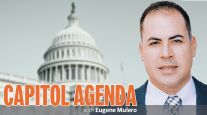Senior Reporter
Trump Fiscal 2020 Budget Request Prioritizes Infrastructure Grants

The Trump White House has learned to stop worrying and love infrastructure grants, to borrow from Kubrick’s Dr. Strangelove.
It took a name change and a couple of years to come to embrace Obama-era grants designed to assist states with advancing infrastructure projects of regional significance.

Mulero
The fiscal 2020 budget request unveiled March 11 calls for dedicating $1 billion for BUILD grants, also known as the grants formerly known as TIGER.
And, the relatively new grants for freight projects named INFRA would receive $2 billion under the budget. The INFRA program has been “successful in providing the seed money necessary to spur nonfederal investment in large projects that relieve congestion on the nation’s strategic multimodal freight network,” according to the budget document.
Additionally, $300 million in “competitive” highway bridge grants made it into the request. In the past, the president’s bean counters have asked Congress for significantly less for such grants, particularly TIGER.
This request for U.S. DOT “focuses on its critical transportation safety mission and provides targeted investments in competitive programs that effectively leverage federal resources to spur larger, partnership-driven investment in infrastructure in key areas.” (Good to know.)
Overall, the Office of Management and Budget noted the fiscal 2020 request of $21.4 billion in discretionary spending is 22% less than the 2019 discretionary estimate.
And, it’s worth highlighting that President Donald Trump is calling on Congress to advance a $1 trillion infrastructure bill, according to the accompanying “Infrastructure Initiative” fact sheet.
Notwithstanding the administration’s sentiment, the budget request is unlikely to get anywhere on Capitol Hill.
Top Democrats already are critical of the White House’s call for additional money for Trump’s border wall, which candidate Trump said would be paid for by Mexico.

Vermont Sen. Patrick Leahy calls the 2020 fiscal budget proposal "divorced from reality." (Office of Senator Patrick Leahy via YouTube)
To drive home the point, Sen. Patrick Leahy, the top Democrat on the Appropriations panel, said the request is “dead on arrival and divorced from reality,” and “not worth the paper it is printed on.” He added, “This is not a serious proposal.”
At budget hearings scheduled for this week, other Democrats will criticize the budget.
The Week Ahead (All times Eastern)
Spotlight Hearing

March 14, 9 a.m.: Ways and Means is at it again. Coming off a high-profile hearing that addressed infrastructure funding concerns, the powerful tax-writing panel will look to break apart Trump’s budget request with the president’s top money guy, none other than Treasury Secretary Steve Mnuchin. Obviously, Trump’s push for lots of dollars for a beautiful wall at the Mexican border will capture top headlines. And the secretary will stick to the script and defend his boss’ approach for protecting the country from the invasion of Central Americans. Besides immigration policy, exchanges regarding climate change, rail and transit projects and freight connectivity are expected.
March 10-13: The National League of Cities hosts its Congressional City Conference. Participants include Rep. Salud Carbajal (D-Calif.),and Boston Mayor Martin Walsh.
March 11, 1 p.m.: The National Archives hosts an event celebrating the anniversary of the Office of Government Information Services, during Sunshine Week. Participants include Archivist of the United States David Ferriero, and chief judge of the United States District Court for the District of Columbia Beryl Howell.
March 12, 10 a.m.: The House Budget Committee meets to review President Trump’s 2020 budget request.
March 12, 10 a.m.: The House Aviation Subcommittee hosts a hearing titled, “Looking Forward: Aviation 2050.”
March 12, 11 a.m.: The House Transportation, Housing and Urban Development, and Related Agencies Appropriations Subcommittee hosts a hearing titled, “Stakeholder Perspectives: Passenger Rail Development.” Participants include Stephen Gardner, senior executive vice president for commercial, marketing and strategy at Amtrak; Jason Orthner, rail division director at the North Carolina Department of Transportation; and D.J. Mitchell, assistant vice president for passenger operations at BNSF Railway.
March 12, 2:30 p.m.: The Senate Communications, Technology, Innovation and the Internet Subcommittee hosts a hearing titled, “The Impact of Broadband Investments in Rural America.” Witnesses include Justin Forde, senior director of government relations at Midcontinent Communications; Mark Jamison, visiting scholar at the American Enterprise Institute; Denny Law, general manager and CEO of Golden West Telecommunications; and Carol Mattey, principal at Mattey Consulting.
March 13, 10 a.m.: The Senate Environment and Public Works Committee hosts a hearing titled, “Diesel Emissions Reduction Act of 2019.”
March 13, 10 a.m.: The House Highways and Transit Subcommittee hosts a hearing titled, “Aligning Federal Surface Transportation Policy to Meet 21st Century Needs.”
March 13, 10:30 a.m.: The House Transportation, Housing and Urban Development, and Related Agencies Subcommittee hosts a hearing titled, “Stakeholder Perspectives: Building Resilient Communities.” Witnesses include Carol Haddock, director of Houston Public Works; Laura Lightbody, project director of flood-prepared communities at Pew Charitable Trusts; and Franklin Moon, civil and environmental engineering professor at Rutgers University.
March 13, 2:30 p.m.: The Senate Budget Committee meets to review Trump’s fiscal 2020 budget request.
Mood Swings
There’s no commitment yet from authorizers on a plan to fund an infrastructure package. Nevertheless, last week’s Ways and Means hearing on the Highway Trust Fund was truly significant. It had been years since tax authorizers heard directly from stakeholders about the account. Also notable is the opposition to approving a fuel tax increase is not as loud as it has been.
In Case You Missed It
The mainstream media is telling us former Vice President Joe Biden will announce his presidential run next month. A strategy on infrastructure policy is fitting into the mix.
Who’s New

Inslee
A presidential candidate running primarily as a climate change crusader? No. It’s not Al Gore. Washington state Gov. Jay Inslee (D) has entered the crowded field of presidential aspirants on the Dems’ side asking voters to join his climate movement. Inslee agrees with the overwhelming scientific data pointing to links between human activity and changes in the climate. Despite lacking name recognition nationally, the former member of Congress took over the governorship in 2013 and has helped advance key infrastructure campaigns. Several Republicans, including Trump, continue to pushback on scientific evidence regarding climate change.
 Buzz
Buzz

They’re known as the laboratories of Democracy for a reason. Thus far this year, 37 states have unveiled nearly 200 measures with the aim of augmenting investments in transportation, the American Road and Transportation Builders Association determined in a recent analysis.
Favorite Video
There’s always surfing.
Favorite Tweet
Budget guru Jeff Davis got beast-mode.
I just took a moment to update my links page - links to every law ever enacted that makes appropriations for the US Dept of Transportation @USDOT - bookmark it if you think you might ever need to look something up... https://t.co/2DzsX8UzUu — Jeff Davis (@JDwithTW) March 8, 2019
The Last Word
Contrary to a common narrative, infrastructure does not face a broad immediate crisis in the U.S.
Marc Scribner, Senior Fellow, Competitive Enterprise Institute, at the Ways and Means Committee on March 6.
We publish weekly when Congress is in session. E-mail emulero@ttnews.com with tips. Follow us @eugenemulero and @transporttopics.




